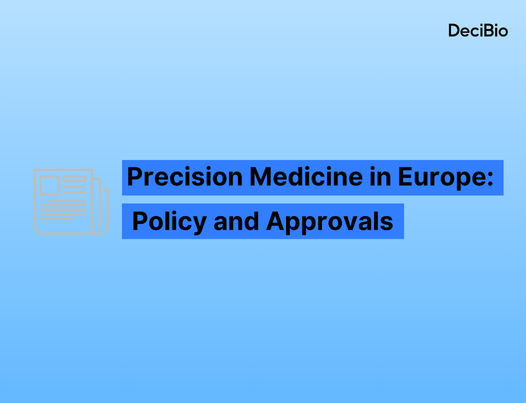Welcome to the inaugural issue of DeciBio's European Precision Medicine Round-Up. Europe stands as a global powerhouse in healthcare innovation, driven by world-class academic research, a robust biopharmaceutical industry, and progressive regulatory bodies. From the centralised oversight of the European Medicines Agency (EMA) to the market-shaping influence of national Health Technology Assessment (HTA) bodies like the UK's NICE, the European landscape presents unique challenges and opportunities. Tracking the continent's policy shifts, landmark drug approvals, and strategic initiatives, this newsletter will track the latest developments, providing expert context on what they mean for the future of personalised healthcare.
Overview and Highlights (July 2025)
July 2025 was a significant month for precision medicine in Europe, continuing a trend of policy evolution seen over the last five years. The European Commission announced a long-term vision with its new strategy to become a global life sciences leader, underpinned by the proposal of an "EU Biotech Act." This policy momentum was matched by tangible progress on the approvals front, with several oncology and immunology therapies and two diagnostic approvals.
At the same time, the United Kingdom took further steps to define its life sciences agenda. The government introduced innovative regulatory frameworks, including a "point-of-care" manufacturing model for advanced therapies and proposed international reliance pathways to speed up MedTech approvals. Market access in the UK also saw significant activity, with regulatory authorisation for new targeted treatments in rare neurological disease and ovarian cancer, alongside positive NICE recommendations for new options in liver cancer and cystic fibrosis.
Together, these developments reflect a concerted effort across Europe to refine healthcare policy and accelerate patient access to innovation, strategically positioning the continent to capitalise on global uncertainty and attract talent, funding, and new technologies.
EU Policy, Regulation and Approvals
1. EU Launches Strategy to Become Global Life Sciences Leader by 2030 | Policy
2. European Commission Approves Merck's Ezmekly | Drug Approval
3. Roche's Itovebi Approved for ER+, HER2- Breast Cancer with PIK3CA Mutation in the EU | Drug Approval
4. EU Greenlights Obe-cel for Acute Lymphoblastic Leukaemia | Drug Approval
5. Roche Gains EU Approval for Alzheimer's Blood Test | Diagnostics Approval
6. Labcorp Achieves IVDR CE Mark for Comprehensive Genomic Profiling Test | Diagnostics Approval
UK Policy, Regulation and Approvals
1. New Life Sciences Sector Plan Unveiled | Policy
2. UK Announces "Point-of-Care" Manufacturing Framework | Regulation
3. MHRA Proposes New International Reliance Routes for Medical Devices | Regulation
4. NICE Recommends Vertex's Next-Generation Cystic Fibrosis Therapy | Reimbursement Approval
5. MHRA Approves Tofersen for Rare Form of Motor Neurone Disease | Therapy Approval
6. MHRA Greenlights Mirvetuximab Soravtansine for Ovarian Cancer | Therapy Approval
EU Policy, Regulation and Approvals
1. EU Launches Strategy to Become Global Life Sciences Leader by 2030 | Policy
The European Commission has launched a new strategy to establish Europe as the world's most attractive location for life sciences by 2030. Backed by over €10 billion annually from the current EU budget, the plan aims to coordinate the entire life sciences value chain. Key actions include proposing an EU Biotech Act to create a more innovation-friendly framework, developing an EU investment plan to facilitate funding for multi-country clinical trials, mobilising €300 million to stimulate procurement of innovations like next-generation vaccines, and launching a matchmaking interface to connect startups with investors.
2. European Commission Approves Merck's Ezmekly | Drug Approval
The EC’s approval of Merck's Ezmekly (mirdametinib) provides the first and only therapy in the EU for both adults and children with neurofibromatosis type 1 (NF1) and symptomatic, inoperable plexiform neurofibromas (PN). As a first-in-class MEK inhibitor for this rare genetic disorder, Ezmekly creates an entirely new market that previously had no approved treatments for adults. This approval establishes a significant clinical benchmark for any future competitors targeting this specific patient population.
3. Roche's Itovebi Approved for ER+, HER2- Breast Cancer with PIK3CA Mutation in the EU | Drug Approval
Roche announced that the European Commission has approved Itovebi (giredestrant) for treating adult patients with ER-positive, HER2-negative advanced or metastatic breast cancer who have an ESR1 mutation. Itovebi is a next-generation oral selective oestrogen receptor degrader (SERD). It will compete with the long-standing injectable SERD, fulvestrant, and the more recently approved oral SERD, elacestrant, offering a new oral option for patients with this specific mutation.
4. EU Greenlights Obe-cel for Acute Lymphoblastic Leukaemia | Drug Approval
The CAR T-cell therapy obe-cel (obilcaptagen autoleucel) from Autolus Therapeutics, has received approval from the European Commission for treating relapsed/refractory (r/r) B-cell precursor acute lymphoblastic leukaemia (ALL) in adults. Obe-cel will compete with other approved CAR-T therapies for B-cell malignancies, such as tisagenlecleucel and brexucabtagene autoleucel, as well as the BiTE antibody blinatumomab. It is designed with a novel binding mechanism to potentially offer a better safety profile regarding neurotoxicity and cytokine release syndrome.
5. Roche Gains EU Approval for Alzheimer's Blood Test | Diagnostics Approval
Roche has secured CE-IVD certification for its Elecsys pTau217 blood test, which can be used to help rule out Alzheimer's disease by identifying the presence of the pTau217 biomarker from a single blood sample. This less invasive test is a significant step forward from current methods that often require more complex and costly cerebrospinal fluid (CSF) tests or PET scans.
6. Labcorp Achieves IVDR CE Mark for Comprehensive Genomic Profiling Test | Diagnostics Approval
Labcorp announced it has received CE marking under the EU's IVDR for its PGDx elio tissue complete test. This is a comprehensive genomic profiling kit that detects single nucleotide variants, small insertions/deletions, and other alterations in over 500 genes from a single tissue sample, providing crucial information for oncologists to guide targeted therapy decisions.
UK Policy, Regulation and Approvals
1. New Life Sciences Sector Plan Unveiled | Policy
The UK government has launched a new strategic plan focused on growing its life sciences sector, backed by £2 billion in public funding. The plan's goals are to boost the economy and transform the National Health Service (NHS) by supporting and integrating medical innovation. The strategy includes 33 specific actions, including a reaffirmation of the commitment to reduce commercial clinical trial setup times to under 150 days and a plan to invest up to £520 million in life sciences manufacturing projects.
2. UK Announces "Point-of-Care" Manufacturing Framework | Regulation
The UK government has established a new regulatory framework to enable the manufacturing of personalised medicines, such as cell and gene therapies, closer to the point of patient treatment. The framework amends the Human Medicines Regulations 2012 to allow for a "hub and spoke" model, where a central licensed site oversees multiple manufacturing locations. This model is particularly critical for Advanced Therapy Medicinal Products (ATMPs) which often have very short shelf-lives and complex logistics and aims to drastically reduce delivery times to patients.
3. MHRA Proposes New International Reliance Routes for Medical Devices | Regulation
The MHRA has proposed new international reliance pathways for medical devices. These pathways would allow manufacturers to use approvals from trusted partners like the EU and US to support their UKCA marking applications, significantly reducing regulatory burdens. For manufacturers, this means lower costs and faster market access, while allowing the MHRA to focus its resources on assessing novel technologies.
4. NICE Recommends Vertex's Next-Generation Cystic Fibrosis Therapy | Reimbursement Approval
Vertex's Alyftrek (vanzacaftor–tezacaftor–deutivacaftor), a next-generation triple-combination CFTR modulator, was recommended after a rapid assessment showed it was as effective as Vertex's own market-leading therapy, Kaftrio. This decision expands the eligible patient population for CFTR modulators and solidifies Vertex's competitive position by offering an advanced therapy option, effectively competing with its own portfolio to maintain market leadership.
5. MHRA Approves Tofersen for Rare Form of Motor Neurone Disease | Therapy Approval
The MHRA has granted marketing authorisation for Tofersen to treat a rare, inherited form of motor neurone disease (MND) caused by mutations in the SOD1 gene. As an antisense oligonucleotide, it is a highly targeted therapy designed to reduce the production of the faulty SOD1 protein. This approval provides the first-ever treatment for the underlying cause of this specific type of MND.
6. MHRA Greenlights Mirvetuximab Soravtansine for Ovarian Cancer | Therapy Approval
The MHRA has approved Mirvetuximab Soravtansine for adult patients with folate receptor-alpha (FRα) positive ovarian, fallopian tube, or primary peritoneal cancer. This antibody-drug conjugate (ADC) specifically targets cancer cells expressing FRα, delivering a potent chemotherapy agent directly to the tumour while sparing healthy tissue. This provides a new targeted option for a patient population with high unmet need.





.png)

.png)

